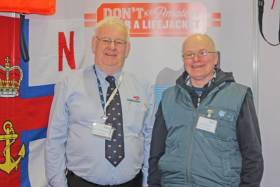Displaying items by tag: Colm Plunkett
Survivor Helps RNLI Promote Water Safety At Ireland Angling Show
#WaterSafety - Shore angler Colm Plunkett, who survived a near drowning incident last August, assisted the RNLI community safety team at the Ireland Angling 2016 show last weekend (20-21 February).
Plunkett shared his experience with hundreds of fellow anglers and watersports enthusiasts from all over Ireland – and promoted the wearing of lifejackets to help prevent the loss of life along coasts, rivers and lake shores.
As previously reported on Afloat.ie, Plunkett was swept from rocks when he was angling near Dursey Island in Cork last August. He spent 55 minutes fighting for his life before he was rescued. He was wearing a lifejacket at the time.
“My main message is that I wasn’t lucky - I was prepared but not nearly as much as I needed to be," he said. "A splash hood on my lifejacket would have saved me from an experience somewhat akin to waterboarding. A personal locator beacon (PLB) would have brought the coastguard directly to me should I have continued out to sea. It would also have initiated a distress call if I had been fishing on my own, which I often do.
"The lifejacket saved my life; the prearranged plan with my daughter saved my life; the cell phone saved my life; the emergency services saved my life. And if through telling others of my harrowing experience, on a ‘calm’ sea, I can get other fishermen to wear a life jacket then it was an experience worth having but definitely not worth repeating."
Plunkett also suggested a prearranged plan for anyone heading out on or near the water:
- Wear a well maintained lifejacket with crotch straps at all times.
- No one else should enter the water in an emergency.
- Call 112 or 999 immediately and ask for the coastguard.
John McKenna, Howth RNLI community safety officer, added: "It was fantastic to have Colm here to share his experience with other anglers. He is a very engaging speaker and he was able to offer targeted, practical suggestions to the visitors at the RNLI stand.
"We hope that it encourages people to think twice and be prepared before they go out fishing on or near the water."
The RNLI’s volunteer lifeboat crews rescued 240 shore anglers and saved 28 lives between 2010 and 2014.
The charity is aiming to reduce coastal drowning significantly by 2024 by expanding its preventative work and launching the Respect the Water campaign, which engages with water users on how to stay safe and maintain their equipment.
If any angling, sailing or boating clubs would like a member of the RNLI sea safety team to give a sea safety presentation and carry out a free lifejacket clinic, contact John McKenna at [email protected]
Irish Angler Warns Others To Put Safety First As He Recalls Day Lifejacket Saved His Life
#WaterSafety - Shore angler Colm Plunkett, who credits his lifejacket with saving his life after he was swept into the sea earlier this year, is supporting a water safety campaign launched this week by the RNLI throughout Ireland and the UK.
Plunkett and the RNLI are urging all shore anglers to wear a lifejacket, which could buy them vital time should they end up in the water unexpectedly.
Between 2010 and 2014 there were 29 anglers rescued while fishing from rocks or the shoreline in Ireland and the charity’s lifeboats were launched 43 times to shore angling callouts.
According to research conducted by the RNLI, only 10% of shore anglers wear lifejackets. Yet an expert casualty review panel found that 81% of the fatalities reviewed between 2007 and 2013 could have been prevented had the casualties been wearing lifejackets.
The safety campaign advises: ‘Don’t be an amateur – wear a lifejacket.’
Irish angler Colm Plunkett is one of those who chose to wear his lifejacket – a decision which ultimately saved his life after he was swept from rocks while fishing at Dursey Sound on the Beara Peninsula in West Cork in August this year.
Plunkett and his daughter Orlaith are backing the campaign and have shared their story with the RNLI for the campaign.
"I was fishing when a rogue wave washed me into the sea," he recounts. "I spent the next 55 minutes fighting for my life. Fortunately I was with my 16-year-old daughter, who immediately called the coastguard. Upon entering the water my lifejacket automatically inflated and kept me on the surface of the sea.
"For the first 15 to 20 minutes I was swept by the current out to sea. I spent 30 minutes or so fighting to get air into my lungs while spitting sea water out of my mouth; as the waves broke over my head and the water ran down my face.
"Much to my relief, the current then pushed me back towards the land and to calmer waters. My state of exhaustion and oncoming hypothermia prevented me from reaching the shore but my daughter shouted to me that help was on the way and, for the first time my spirits rose."
Ten minutes later, he recalls, the inshore rescue boat from Derrynane, Co Kerry reached him. "I was brought to shore with a life-threatening low temperature and was taken to hospital by helicopter for further assessment and treatment.
"I am here solely because I wear a lifejacket. If you are not wearing a lifejacket, you are as good as dead."
There are some simple steps anglers can follow to keep themselves safe:
- If fishing from the shoreline, wear a lifejacket.
- Tell someone where you’re going and when you expect to be back.
- Carry a means of calling for help.
The campaign forms part of the RNLI’s work to halve the number of accidental coastal deaths by 2024.





























































